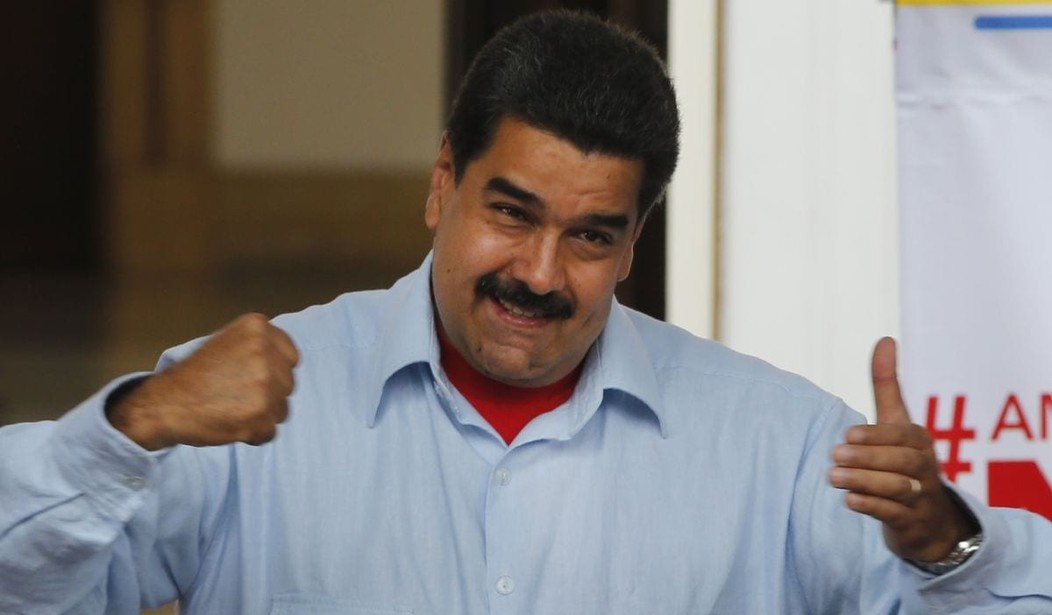Venezuela’s hapless president, Nicolas Maduro, announced on state TV that workers would be getting Fridays off for the next two months in a bid to conserve electricity.
The electricity crisis has been building for several years and has now reached the point where a total blackout of the city of Caracas may occur by the end of this month unless drastic measures are taken.
“This plan for 60 days, for two months, will allow the country to get through the most difficult period with the most risk. I call on families, on the youth, to join this plan with discipline, with conscience and extreme collaboration to confront this extreme situation,” Maduro said.
The government’s plan will be effective from this Friday and last until June 6, according to Agence France Presse.
Some Venezuelans took it to social media to express their surprise.
Maduro’s no-work Friday decision is meant to last 60days #venezuela #PowerCrisis he doesnt seem to know people also burn electricity at home
— Margot (@margotch) April 7, 2016
Many others wondered how the measure would impact schools, bureaucratic procedures and supermarkets.
It was not immediately clear how the non-working Fridays would affect the public and private sector.
The announcement comes after the President shut down the country for a week over the Easter period as an energy crisis gripped the country.
The traditional two-day Easter holiday was extended by three days, effectively closing the country, which is also in the throes of an economic crisis, for a full working week.
You might be wondering how a nation sitting on an ocean of oil could be experiencing an electricity crisis. It’s not socialist incompetence in the energy sector that’s the problem. It’s socialist incompetence in managing the electric grid.
How did things get so bad? Partly this is a story about drought. More than 60 percent of Venezuela’s electricity comes from hydropower, and a lack of rainfall this winter due to El Niño has led to low water levels at its all-important Guri Dam.
But the bigger story here is that Venezuela’s socialist government has badly mismanaged the electric grid for years. Since 2000, the country has failed to add enough electric capacity to satisfy soaring demand, making it incredibly vulnerable to disruptions at its existing dams. Venezuela has been enduring periodic blackouts and rationing ever since 2009 — and there’s no sign things will improve anytime soon.
To understand why Venezuela, a country with the world’s biggest oil reserves, keeps suffering from energy shortages, we have to look at the country’s grid. The vast majority of the country’s electricity comes not from fossil fuel generators but from hydroelectric dams:
Most of the time, hydropower is a clean, reliable source of electricity. The trouble occurs when there’s a drought and water levels in the reservoir fall too low to spin the dam’s turbines. That’s what’s happening at Venezuela’s massive Guri Dam, which provides 75 percent of Caracas’ electricity. If water levels fall four more meters — which could happen by the end of April — operators have to shut off the turbines off.
This problem isn’t unique to Venezuela: any place that relies on dams faces this risk. California has seen its hydro output plummet in the past few years amid a historic dry spell. The difference is that California has excess electric capacity elsewhere — natural gas turbines, mainly — that it can fire up to compensate.
Venezuela, crucially, doesn’t have a good backup plan if its dams fail. And that’s where the years of mismanagement come in.
It shouldn’t surprise anyone that after the grid was nationalized, the problem only got worse. Nor is it surprising that if you subsidize something, you get more of it. This truism was apparently unknown to Chavez, who bought votes by giving people money to pay their electric bill but didn’t buy enough electrical capacity:
In the 2000s, after Hugo Chávez came into office, investment in new electric capacity in Venezuela dried up, particularly after he nationalized the grid in 2007. But demand for power kept soaring after the government froze electricity rates in 2002 and began subsidizing consumption. More and more people bought air conditioners, TVs, and so on. Today, Venezuela’s per capita rate of electricity use is one of the highest in Latin America.
Those two trends put a severe strain on the grid. “Between 2003 and 2012,” notes the US Energy Information Administration, “Venezuela’s electricity consumption increased by 49% while installed capacity expanded by only 28%, leaving the Venezuelan power grid stretched.” It doesn’t help that many households connect to the grid illegally, tapping into existing power lines.
It’s nearly impossible to visualize Caracas, a city of more than 2 million people, losing power not for hours or even days, but weeks and perhaps months. If that happens (does anyone have confidence that Maduro can manage the crisis effectively?), Caracas should be made the poster child for the failures of socialist government.










Join the conversation as a VIP Member